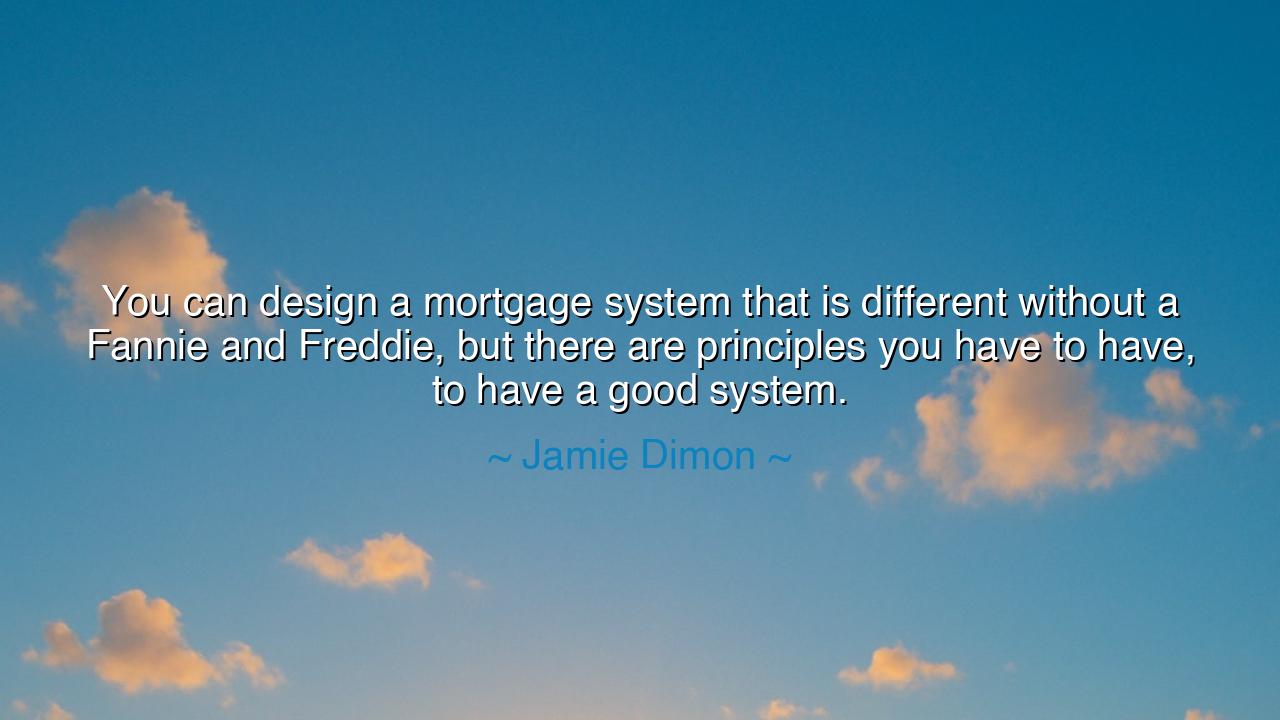
You can design a mortgage system that is different without a
You can design a mortgage system that is different without a Fannie and Freddie, but there are principles you have to have, to have a good system.






The words of Jamie Dimon—“You can design a mortgage system that is different without a Fannie and Freddie, but there are principles you have to have, to have a good system”—speak not merely of finance, but of order, wisdom, and the eternal laws that govern all creation. In the language of commerce, Dimon speaks as an architect of systems, yet beneath his pragmatic tone lies a timeless truth: that freedom without foundation leads to collapse, and innovation without principle breeds chaos. His words are not about mortgages alone; they are about the balance between creativity and structure, the sacred bond between change and the unchanging truths that sustain it.
To design a system—whether of finance, governance, or even the self—is to engage in the same sacred act that the ancients attributed to the divine. Yet every design, no matter how brilliant, must rest upon principles—the invisible pillars that bear the weight of its form. Dimon reminds us that while systems may evolve, the laws of stability remain eternal. One may discard institutions like Fannie Mae and Freddie Mac, he says, but one cannot discard the underlying truths that keep markets—and societies—just and whole. These principles are like the roots of a mighty tree: unseen, but essential. Remove them, and no matter how tall the trunk rises, it will fall at the first storm.
Throughout history, the wisest builders and reformers have known this. Consider Solon of Athens, who, more than two thousand years ago, rebuilt the laws of his city when corruption and debt had nearly torn it apart. He did not abolish order, nor did he cling blindly to the old forms. Instead, he reimagined the system upon principles of balance and justice. He freed the enslaved, limited greed, and established fairness between the rich and poor. His reforms transformed Athens from a city on the brink of ruin to the cradle of democracy itself. Like Dimon, Solon understood that systems can change in form, but must endure in spirit—for without moral architecture, even the grandest institutions will decay.
In our modern age, we see the same truth written across the history of markets and nations. When systems of wealth or power forget their principles—when they serve profit over purpose, or abandon integrity for speed—they sow the seeds of their own destruction. The financial crisis of 2008 was not merely a failure of banks; it was a failure of principle. The builders of the system forgot that trust, transparency, and responsibility are not luxuries—they are the sacred foundations upon which all prosperity rests. Dimon’s words, spoken in the shadow of that great collapse, remind us that design without conscience is like architecture without gravity—it cannot stand.
Yet within his words, too, lies hope, not condemnation. He does not say that the system is doomed, but that it can be redesigned, renewed by returning to its core truths. This is the eternal cycle of creation: destruction followed by rebuilding, decay followed by reform. Just as an artist learns from his failed work, a society must learn from its crises. Dimon’s call is for wisdom in innovation—to build anew, yes, but to build upon the immutable laws of fairness, accountability, and foresight. For a “good system,” as he says, is not one that avoids change, but one that endures through it.
There is also a moral teaching here that extends beyond markets and into the lives of men and women. Each of us is, in truth, a designer—a builder of habits, relationships, and destinies. We, too, may wish to discard the old ways that no longer serve us, to reinvent ourselves anew. But if we do so without principle, without the grounding of virtue, we risk building our lives upon sand. The ancients taught that character is to the soul what foundation is to the temple. You may adorn your life with all the ornaments of success, but without honesty, humility, and discipline, it will crumble when tested.
Let this, then, be the teaching: change what must be changed, but keep what must be kept. Whether you are building a home, a business, a nation, or a life, begin not with fashion or convenience, but with truth. The forms may evolve, the tools may differ, but the principles—justice, balance, integrity—must remain eternal. If you must design anew, do so with reverence for the forces that make stability possible. For it is not innovation alone that sustains the world—it is wisdom joined with will, freedom joined with foundation.
In the end, Jamie Dimon’s words remind us that the art of creation, whether in stone or policy, lies in discipline guided by purpose. To build well is to honor the eternal even as we shape the new. So, as the builders of old consulted the stars before laying their foundations, so too must we consult the principles of right and reason before designing our own systems—financial or personal. Only then will our work endure the trials of time, standing firm not because it is unshaken, but because it was built upon truth.






AAdministratorAdministrator
Welcome, honored guests. Please leave a comment, we will respond soon